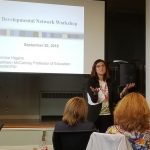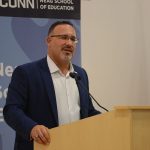The following is an excerpt from Chapter 1 of The Strategy Playbook for Educational Leaders: Principles and Processes (Routledge, 2021), a new book co-authored by Neag School Associate Professor Jennie Weiner and her colleague Isobel Stevenson, director at the Connecticut Center for School Change.
The volume is a how-to resource designed for superintendents, central office staff, principals, and teacher leaders that looks to “provide leaders with a concrete framework for a strategic improvement pan, helping educators link the ‘principles’ to ‘processes’ of planning.”
Through a collaboration with Lehigh University, Neag School of Education associate professor Jennifer Freeman will develop an intervention to improve college and career readiness for students with emotional and behavioral disorders. This $500,000 grant is sponsored by the Institute of Education Sciences (IES). Freeman is a Co-PI with Lee Kern and Chris Liang at Lehigh University.
Through a collaboration with Lehigh University, Neag School of Education associate professor Jennifer Freeman will develop an intervention to improve college and career readiness for students with emotional and behavioral disorders. This $500,000 grant is sponsored by the Institute of Educational Sciences (IES). Freeman is a Co-PI with Lee Kern and Chris Liang at Lehigh University.
The COVID pandemic has laid bare the extent of inequalities across Connecticut’s cities, towns, and school districts and the children and families they serve. Connecticut has long been one of our nation’s most racially and economically segregated states, while also one of the wealthiest. In the past decade those inequities have worsened along both economic and racial lines. In 2021, Connecticut continues to face the interrelated challenges of segregation and school funding equity and adequacy. Connecticut must do better.
When 2020 began, we had no clue as to the changes coming to our children’s education. Looking to the new year, the only thing that seems certain is that uncertainty in school opportunity, format, and structure will continue as the conditions around us adjust. School will carry on as unpredictable and unprecedented.
We may be tired of being asked to look for silver linings, or bright prospects, to the changed education landscape. But here’s why it’s important to check our expectations and consider shifts in how we frame this school year.
Miguel Cardona ’01 MA, ’04 6th Year, ’11 Ed.D., ’12 ELP is President-elect Joe Biden’s choice to be the country’s top education official. If confirmed by the Senate, this would mark the first time a University of Connecticut alum has held a Cabinet-level position in the White House.
Preschool can help ensure that children reach their fullest potential. Research suggests that preschool has a strong, positive impact on children’s brain development, relationships, and knowledge acquisition, as well as a broader return on investment for society. This brief summarizes this research and investigates preschool access in Connecticut.
We call them our colleagues, our peers, our mentors, or our coworkers – they are the people in our professional lives that also share in the details of our personal lives, who we associate with voluntarily, and who we trust with our thoughts, our experiences, and our fears.
Outside of work, we might call these relationships “friendships,” but it’s rarer to hear that particular f-word at the office – and the reason has to do with more than just semantics.
The University of Connecticut has been awarded a $179,000 grant from the U.S. Department of Education’s Office of Postsecondary Education for a new research project centered on reimagining dual language education. The project’s purpose is to improve the ability of dual language programs to promote the equitable bilingualism and biliteracy development of all students through a greater focus on sociocultural competence.







